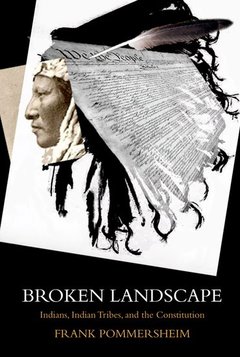Description
Broken Landscape
Indians, Indian Tribes, and the Constitution
Author: Pommersheim Frank
Language: English
Subjects for Broken Landscape:
Approximative price 49.02 €
In Print (Delivery period: 21 days).
Add to cart
Broken landscape: indians, indian tribes, and the constitution (paperback)
Publication date: 04-2012
424 p. · 15.5x23.4 cm · Hardback
Publication date: 04-2012
424 p. · 15.5x23.4 cm · Hardback
Approximative price 155.51 €
Subject to availability at the publisher.
Add to cart
Broken landscape: indians, indian tribes, and the constitution
Publication date: 09-2009
424 p. · 16.6x24.2 cm · Paperback
Publication date: 09-2009
424 p. · 16.6x24.2 cm · Paperback
Description
/li>Contents
/li>Biography
/li>
Broken Landscape is a sweeping chronicle of Indian tribal sovereignty under the United States Constitution and the way that legislators have interpreted and misinterpreted tribal sovereignty since the nation's founding. Frank Pommersheim, one of America's leading scholars in Indian tribal law, offers a novel and deeply researched synthesis of this legal history from colonial times to the present, confronting the failures of constitutional analysis in contemporary Indian law jurisprudence. He demonstrates that the federal government has repeatedly failed to respect the Constitution's recognition of tribal sovereignty. Instead, it has favored excessive, unaccountable authority in its dealings with tribes. Pommersheim argues that the Supreme Court has strayed from its Constitutional roots as well, consistently issuing decisions over two centuries that have bolstered federal power over the tribes. Closing with a proposal for a Constitutional amendment that would reaffirm tribal sovereignty, Broken Landscape challenges us to finally accord Indian tribes and Indian people the respect and dignity that are their due.
Part One: The Early Encounter. 1. Introduction: A New Challenge to Old Assumptions. 2. Early Contact: From Colonial Encounters to the Article of Confederation. 3. Second Opportunity: The Structure and Architecture of the Constitution. 4. The Marshall Trilogy: Foundational but Not Fully Constitutional?. 5. Lone Wolf v. Hitchcock: The Birth of Plenary Power, Incorporation, and an Extraconstitutional Regime. Part Two: Individual Indians and the Constitution. 6. Elk v. Wilkins: Exclusion, Inclusion, and the Ambiguities of Citizenship. 7. Indians and the First Amendment: The Illusion of Religious Freedom?. Part Three: The Modern Encounter. 8. Indian Law Jurisprudence in the Modern Era: A Common Law Approach Without Constitutional Principle. 9. International Law Perspective: A New Model of Indigenous Nation Sovereignty?. 10. Conclusion: Imagination, Translation, and Constitutional Convergence.
Professor of Law, University of South Dakota
© 2024 LAVOISIER S.A.S.
These books may interest you

Tribes, Land, and the Environment 177.01 €



